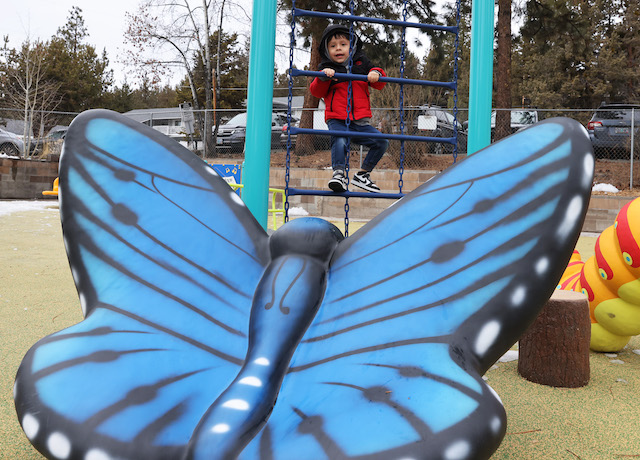Parents oppose cuts to services for disabled children in Central Oregon
Published 6:00 am Thursday, June 19, 2025

- Adriel climbs on an apparatus above a giant butterfly on the new playground at the Alyce Hatch Center in Bend. 02/18/25 (Dean Guernsey/The Bulletin)
A group of parents, caregivers and teachers of special needs children asked the High Desert Education Service District to reconsider budget cuts Tuesday night that would decrease services their children rely on while attending Central Oregon schools.
High Desert ESD board members answered questions about funding and acknowledged parents’ concerns, but ultimately passed the budget. If the budget was not passed by June 30, the regional service provider, which provides specialists for disabilities, early intervention and early childhood education for children through age 5 and more, would run the risk of not having any funding at all.
The district’s 2025-26 $90.6 million budget is 2% less than its 2024-25 budget and it anticipates a 22% reduction in federal grants.
In a letter to parents Friday, Jenny Faircloth, executive director of early intervention and early childhood special education programs, wrote, “We are facing a substantial budget deficit, primarily due to projected flat federal funding and rising operational costs. As a result, we are making some necessary adjustments, which unfortunately means there will be fewer staff members for the 2025–2026 school year.”
Students who receive special help in school classrooms through early intervention and early childhood special education will be assisted two days a week next school year. Programs will have fewer staff though specific changes to programs are still to be determined.
The district primarily serves Bend-La Pine Schools, Crook County Schools and the Redmond and Sisters school districts, and provides services throughout Central Oregon.
Board member Anthony Georger confirmed that most of the budget funding is already earmarked for certain services and cannot be moved. The budget is also passed before the district knows the amount of funding that will be granted by the Oregon Legislature.
“I just want to say that for everybody who’s here, we’ve heard you, and believe me, pretty overwhelmed by the response from everybody, I can tell that you deeply care about your programs and we do want to help, but tonight we have to pass this budget, otherwise we would run the risk of having no funding at all,” said Goerger. “(I propose that we) continue to work on anything we can to improve the quality of these programs over the next year.”
The administration has not been without cuts, either. Superintendent Sara Johnson said the district does not currently have an assistant superintendent. The district is also absorbing resignations through attrition, she said.
“(Early intervention/early childhood special education) is a grant-funded program and, again, you can’t move it around and you have to run it within the amount the grant designates. That’s what it’s built on and that’s why it’s so much more restricted than it ever has been,” said Johnson.
An increase in skills and abilities
Several parents and caregivers were on the verge of tears as they spoke about how the HDESD has helped their children, and how cuts would impact their learning. Several children also attended the meeting.
Parents held signs that read: ‘When they can’t speak, we must.’
“My granddaughter started with two days a week of in-school instruction, and this year just went to three days. We saw such an increase in her skills and abilities that we are devastated if her services are cut to two days a week,” Sherry Lauer, grandmother of a nonverbal autistic four-year-old named Adelynn who attends Alyce Hatch Center, which provides early intervention and early childhood special education for children with special needs, said at the board meeting. “Children with disabilities, children from migrant families, and children learning English: these are the very kids who need stability, structure and early help. Cutting them off doesn’t just hurt their future, it will cost our community in the short term and the long term.”
Lauer lives with her daughter, Tiffany Nusser, and her granddaughter to help with Adelynn’s care.
“These are our most vulnerable kids, this budget doesn’t meet them where they are, it leaves them behind,” Nusser told the board.
Jacqueline Moran, an early childhood special education specialist, implored board members, administrators and government leaders to join educators on home visits and to see the work they do every day for children.
“(Autism spectrum disorder) diagnoses are rising, and not just the numbers, but in the level of need and intensity and support required,” she said. ”Their need for individualized care, consistent routine, skilled staff and high-quality services are only increasing….Please do not make decisions about our programs and our children without coming first to see them.”
Avian Brown, an early childhood educator who worked at the Alyce Hatch Center, read a poem for the board she’d written about her work with children. In part, she wrote, “They do not speak the way we do,/But still, their hearts come shining through./A glance, a word, a calm held hand/The start of something they now understand.”








